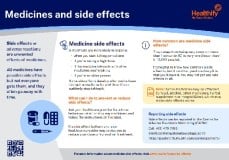You can now add Healthify as a preferred source on Google. Click here to see us when you search Google.
Osteoporosis medicines
Medicines to treat osteoporosis
Key points about medicines for osteoporosis
- The main goal of treatment is to prevent fractures.
- Medicines used for osteoporosis work by slowing or stopping bone loss or rebuilding bone.
- The preferred medicines to treat osteoporosis are called bisphosphonates, for example alendronate, risedronate and zoledronate.

The main goal of osteoporosis treatment is to reduce the risk of fractures. Medicines for osteoporosis work by slowing bone loss, strengthening bones, or helping the body build new bone.
Treatment has been shown to reduce:
- hip fractures by up to 40%
- fractures of the spine by 30 to 70%
- other fractures by 15 to 20%, depending on the medicine used.
Bisphosphonates (alendronate, risedronate, zoledronic acid) are the preferred treatment for osteoporosis. Other treatments include denosumab and teriparatide.
Menopausal Hormone Therapy (MHT) is not usually used as the main treatment for osteoporosis. However, it can help increase bone strength and lower the risk of fractures in women after menopause.
The treatment you’re prescribed is based on your individual risk, such as which type of fracture you’re more likely to have, other health conditions, and other medicines you take.
Bisphosphonates are the preferred medicines to treat osteoporosis
- These medicines work on the bone-making cells to slow loss of bone and help restore some bone that has been lost. They've been shown to reduce the fracture rate in people with osteoporosis. Read more about bisphosphonates.
- Tablets: Alendronate (Fosamax or Fosamax Plus, which includes vitamin D) and risedronate are available as tablets which are taken only once a week. You need to follow instructions carefully to avoid side effects and make sure the medicine is absorbed so it's effective.
- Injection: Some people may find taking the injection zoledronic acid, once every 12 to 18 months more convenient.
Denosumab and teriparatide injection
- They're usually used for people at high fracture risk or when other treatments are unsuitable or haven't worked well. Learn more about denosumab and teriparatide.
Menopausal hormone therapy (MHT)
- MHT is not usually used as the main treatment for osteoporosis. However, it can help increase bone strength and lower the risk of fractures in women after menopause.
- The use of MHT for osteoporosis is generally considered for younger postmenopausal women, within 10 years of menopause, with menopausal symptoms, and who are at high risk of fractures. Bone loss starts again when MHT is stopped. Read more about menopausal hormone therapy (MHT).
Calcium supplements
- Calcium is an important building block for strong bones. Getting enough calcium from your diet helps keep your bones healthy, but taking more than you need doesn't provide extra benefit.
- Most people can get enough calcium from foods, for example, about four serves of dairy per day. If this is difficult, a calcium supplement may be recommended.
- Calcium supplements can help slow bone loss, but they usually don't stop it completely.
- If you have osteoporosis and have already had a fracture, calcium alone is not enough to prevent more fractures. You'll also need a specific osteoporosis medicine. However, having enough calcium and vitamin D is important to support your bones while you're on osteoporosis treatment.
- The most common calcium supplement is calcium carbonate. Read more about calcium supplements.
Vitamin D supplements
- Vitamin D is essential for keeping bones and muscles strong. Your body makes most of the vitamin D it needs when your skin is exposed to sunlight.
- Some people, such as those who spend a lot of time indoors and those with dark skin, may have difficulty producing enough vitamin D.
- If you have osteoporosis, vitamin D tablets called colecalciferol may be recommended. These tablets are only taken once a month. Read more about colecalciferol.
Osteoporosis medicines only work if you take them regularly as prescribed. Continuing your medicines can:
- help strengthen your bones
- slow down bone loss
- lower your risk of breaking a bone.
Osteoporosis medicines work slowly over time, so you won’t feel or notice them working straight away. Regular follow-up with your healthcare provider is important to make sure your treatment is working well and still right for you. If you have questions, side effects, or concerns, don’t stop your medication on your own. Your healthcare provider can help adjust your treatment or discuss other options. Stopping treatment can increase your risk of a fracture, which may seriously affect your health and daily life.
Live Stronger NZ(external link)
All about osteoporosis(external link) Osteoporosis NZ
Osteoporosis and you(external link) Osteoporosis NZ
Osteoporosis and fractures(external link) Osteoporosis NZ
Stop at one [PDF, 1.8 MB] International Osteoporosis Foundation
References
- Osteoporosis(external link) New Zealand Formulary
- Bisphosphonates(external link) New Zealand Formulary
Brochures

Medicines and side effects
Healthify He Puna Waiora, NZ, 2024

Health Quality and Safety Commission, NZ, 2019 English, te reo Māori
Credits: Sandra Ponen, Pharmacist, Healthify He Puna Waiora. Healthify is brought to you by Health Navigator Charitable Trust.
Reviewed by: Angela Lambie, Pharmacist, Auckland
Last reviewed:


